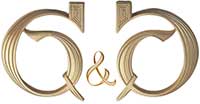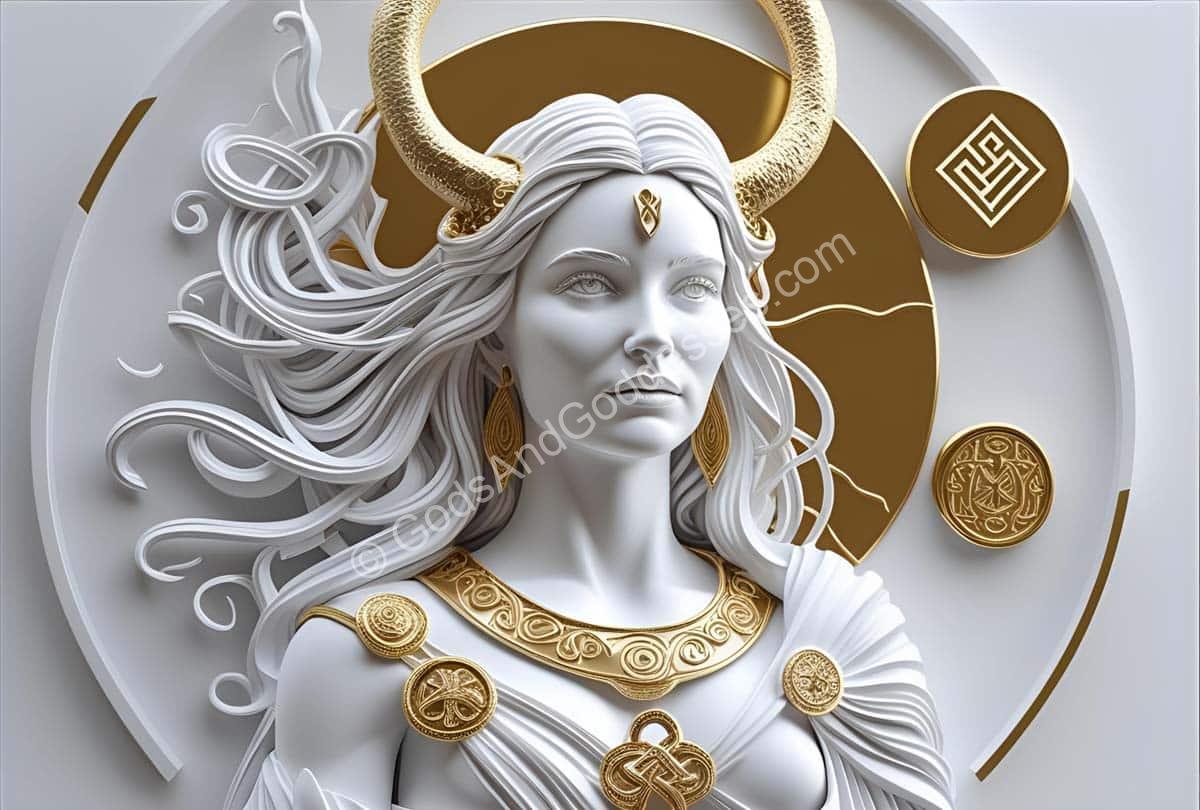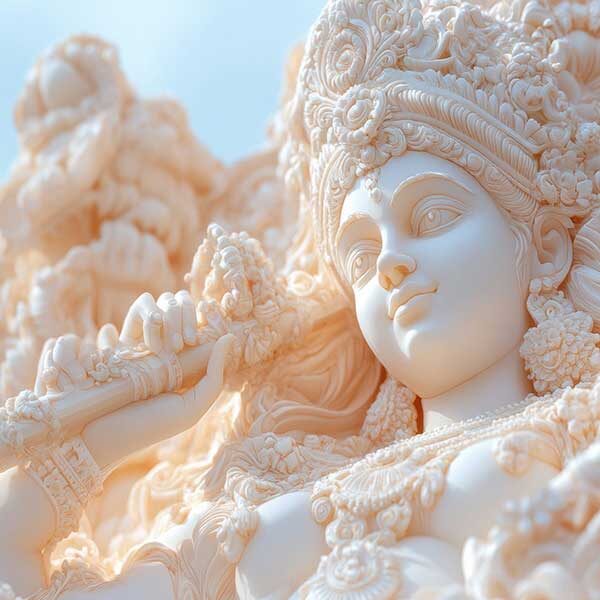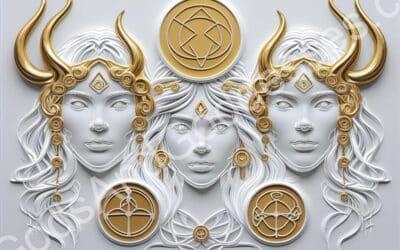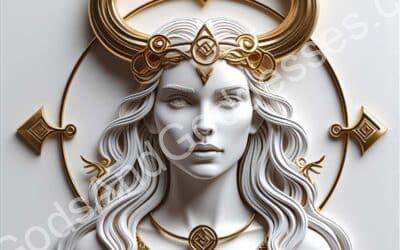Introduction: Why Frigg Matters
In the halls of Asgard, one figure holds quiet but commanding power: Frigg, queen of the Æsir, wife of Odin, and mother of Baldr. She is a goddess of marriage, family, prophecy, and sovereignty. Her wisdom is unrivaled, and though she often keeps her knowledge secret, her influence shapes the destinies of gods and mortals alike.
At GodsAndGoddesses.com, we explore Mythology, Gods, and Goddesses. As one of the foremost Norse Goddesses, Frigg’s story connects deeply with Goddess Types, Goddess Symbols, and broader themes of fate in Mythological Themes.
“Frigg is the silent weaver of fate—the queen who knows all, but speaks only when destiny demands it.”
Key Takeaways About Frigg
-
Frigg is queen of the Æsir, wife of Odin, and mother of Baldr.
-
She is the goddess of marriage, family, and foresight, knowing all destinies.
-
Her symbols include the spinning wheel, distaff, keys, and the sky.
-
Her most famous myth is tied to Baldr’s death, which even her foresight could not prevent.
-
She is sometimes blended with Freyja, another Norse goddess of love and fate.
Who Is Frigg in Norse Mythology?
Frigg (sometimes spelled Frigga) is one of the foremost goddesses of the Æsir. She is the wife of Odin, the All-Father, and thus the Queen of Asgard.
Her roles include:
-
Goddess of marriage and family – Protector of households, women, and children.
-
Goddess of foresight – She knows the fates of all beings, but rarely reveals them.
-
Sky goddess – Associated with weaving clouds and spinning destiny.
Frigg is sometimes confused or blended with Freyja, another powerful goddess of love and magic. While they share overlapping traits, most scholars treat them as distinct.
Frigg’s Domains and Powers
-
Marriage and Motherhood – Guardian of family, fidelity, and domestic order.
-
Prophecy – Frigg possesses foresight, knowing the future, though she often remains silent.
-
Sovereignty – As Odin’s wife, she shares ruling authority over Asgard.
-
Weaving and Spinning – Said to weave clouds across the sky and weave fate itself.
See also: Goddess Types
Symbols of Frigg
-
Spinning Wheel and Distaff – Representing her weaving of clouds and fate.
-
Keys – As mistress of the household, Frigg holds the keys of Asgard.
-
The Sky – Her weaving imagery links her to the heavens.
-
Motherhood – She is depicted as a nurturing, protective figure, especially as Baldr’s mother.
See related: Goddess Symbols
Frigg in Myth
The Death of Baldr
The most famous myth about Frigg centers on her son Baldr, god of light and joy. When she foresaw his death, she traveled the Nine Realms, extracting oaths from all things not to harm him. But she overlooked the humble mistletoe.
Loki tricked Baldr’s blind brother Höðr into throwing a dart made of mistletoe, which killed Baldr. Despite her power and foresight, Frigg could not prevent fate.
The Silent Knower
In many myths, Frigg is portrayed as knowing destiny but choosing silence. Unlike Odin, who sacrifices for wisdom and reveals truths through riddles, Frigg’s knowledge is quiet, embodying acceptance of fate.
Archetypes of Frigg
-
The Queen – Sovereign, dignified, and commanding.
-
The Mother – Protector of children, households, and fertility.
-
The Prophetess – Keeper of destiny, silent but all-knowing.
-
The Weaver – Connected to spinning, weaving, and fate’s threads.
See more at: Goddess Types
Frigg and Worship
In ancient Norse culture, Frigg was likely invoked in:
-
Marriage rituals – Ensuring fidelity and harmony.
-
Childbirth – Protecting women and newborns.
-
Household prayers – Blessings for domestic stability.
In modern paganism, she is honored as a goddess of sovereignty, motherhood, and foresight.
See also: Goddess Worship and Rituals
Frigg and Freyja
One of the great mysteries of Norse mythology is the overlap between Frigg and Freyja. Both:
-
Govern love, fertility, and fate.
-
Have halls for warriors (Frigg’s Fensalir and Freyja’s Fólkvangr).
-
Are associated with Friday (Frigg’s Day or Freyja’s Day).
Some scholars argue they were once the same goddess, later split in the myths. Others view them as distinct but complementary powers.
Frigg in Modern Culture
-
Language – “Friday” is derived from Frigg (or Freyja).
-
Neo-paganism – Revered as a goddess of family, wisdom, and prophecy.
-
Popular culture – Appears in retellings, novels, and comics, though often overshadowed by Odin or Freyja.
External reference: World History Encyclopedia – Frigg
FAQs About Frigg
What is Frigg the goddess of?
Marriage, motherhood, prophecy, and the sky.
Is Frigg the same as Freyja?
Sometimes conflated, but generally treated as distinct.
What is Frigg’s hall called?
Fensalir, meaning “Hall of the Marshlands.”
Why is Frigg important?
As Odin’s wife and Queen of Asgard, she symbolizes family, sovereignty, and foresight.
Conclusion
Frigg is the queen who rules beside Odin, the mother who mourns Baldr, and the weaver of fate who accepts destiny with solemn grace. She is both sovereign and sorrowful, embodying the wisdom of silence and the strength of motherhood.
To honor Frigg is to honor family, foresight, and the quiet strength that holds Asgard together.
Explore further with:
“Frigg is the silent queen, the mother of gods, and the weaver of clouds across the sky of destiny.”
- Odin God Story - August 24, 2025
- The Story of Ra: Egyptian Sun God and Creator - August 24, 2025
- Kraken: Mythological Sea Monster of the Deep - August 24, 2025
